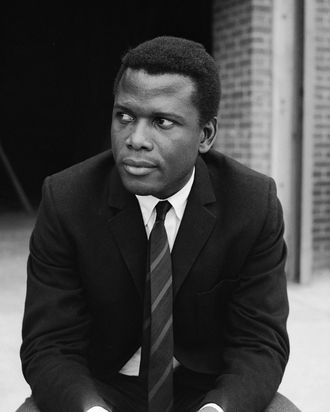
Sir Sidney Poitier, the trailblazing Black actor, director, activist, and ambassador, has died at 94. He was the first Black man to win an Academy Award for Best Actor.
Poitier was born in Miami in 1927 and grew up on Cat Island in the Bahamas. He eventually moved back to Miami and later to New York, where he made his Broadway debut in a production of the classical Greek play Lysistrata.
He made his film debut in 1950’s No Way Out, in which he played a doctor tasked with treating a racist white criminal, and he went on to perform many roles in films that explicitly engage with race, a topic mainstream Hollywood often avoided. In 1964, Poitier made history when he won the Oscar for Best Actor for his role in Lilies of the Field, making him the first Black man to do so. At the time, Poitier hoped his win would break down barriers for other Black actors. “I like to think it will help someone,” he told the New York Times that year. “But I don’t believe my Oscar will be a sort of magic wand that will wipe away the restrictions on job opportunities for Negro actors.”
In the ’50s and ’60s, Poitier rose to stardom in openly bigoted Hollywood, playing leading roles in films like To Sir With Love, In the Heat of the Night, and Guess Who’s Coming to Dinner. In his acting career, Poitier pushed back against the stereotypical, two-dimensional roles to which Black actors were typically relegated in Hollywood, turning down subservient parts such as butlers. “I felt very much that I was representing 15, 18 million people with every move I made,” he wrote in his essay “Measure of a Man.” He was also an active participant in the civil-rights movement, marching with Martin Luther King Jr. in the segregated South.
In the decades following, Poitier continued his acting career, though he appeared onscreen with less frequency. He also took up directing. As times changed and Hollywood grew more inclusive, Poitier expressed relief. “I was carrying the hopes and aspirations of an entire people,” he once told the New York Times. In response to critics who took issue with the types of roles he took, calling him “lackey” and “million-dollar shoeshine boy” and accusing him of being generally out of touch with the civil-rights movement, Poitier added, “I have no control over the content, no creative leverage except to refuse to do a film, which I often did.”
In 2009, President Barack Obama awarded Poitier the Presidential Medal of Freedom, remarking that the actor didn’t make movies but “milestones.” Remarking on Poitier’s enduring, indelible legacy in Hollywood, director Quentin Tarantino once said, “There was pre-Poitier, and there was Hollywood post-Poitier.”





